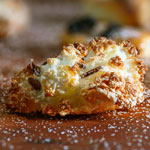National Macaroon Day Date in the current year: May 31, 2026
 Macarons and macaroons may have the same origins, but these are two different type of cookie that shouldn’t be confused with each other. So when you celebrate National Macaroon Day on May 31, you should remember that it is dedicated to small coconut cookies that have been popularized by American Jews.
Macarons and macaroons may have the same origins, but these are two different type of cookie that shouldn’t be confused with each other. So when you celebrate National Macaroon Day on May 31, you should remember that it is dedicated to small coconut cookies that have been popularized by American Jews.Macaroons are small unleavened cookies that are made with ground almonds, coconut or other nuts instead of flour, and egg whites. They are believed to have originated in 8th or 9th century Italy. The word “macaroon” (and its French counterpart macaron) derives from the Italian word maccarone or maccherone, which means “paste” (in this case, almond paste that macaroons were originally made of).
Macaroons made their way to France in the 16th century thanks to Catherine de’ Medici’s marriage to King Henry II of France. The new queen consort of France brought Italian pastry chefs with her, and this is how the transformation of Italian macaroons into French macarons began.
Meanwhile in Italy, macaroons became popular among local Jews because they were made without flour or leavening and therefore could be eaten during the celebration of Passover, when all leavened foods are prohibited. The cookie was eventually introduced to Jewish communities in other parts of Europe and became a year-round treat.
It was Jewish immigrants who brought macaroons to the United States in the second half of the 19th century, during a big wave of immigration from Europe. Since almond flour was expensive and hard to come by, they replaced it with shredded coconut. The recipe was popularized by Esther Levy, who included it into her First Jewish American Cookbook published in 1871.
Today, coconut macaroons are the most common type of macaroons in North America. They consist of just a few ingredients: coconut, egg whites, starch, sugar or another sweetener, and flavoring (optional). They are gluten-free, dairy-free, and vegetarian (but not vegan because of egg whites). To this day, macaroons are a popular Passover treat among Jews because they are unleavened.
Homemade coconut macaroons and those produced by small bakeries are typically lighter and fluffier than commercially made varieties. Commercially produced coconut macaroons are usually star-shaped and come in a variety of flavors. Macaroons made from almonds or other nuts tend to have other shapes because they are made from a denser dough than coconut macaroons.
The origins of Natural Macaroon Day are unclear, but when have such things stopped anyone from celebrating their favorite foods? If you love macaroons and need an excuse to enjoy them, this holiday is just for you!
There are many ways to observe National Macaroon Day and pay tribute to macaroons. You can learn about the difference between macarons and macaroons and tell others about it, get some macaroons from your favorite bakery and enjoy them with coffee or tea, make macaroons (there are easy no-bake recipes that you can use if you don’t have an oven or don’t like to bake), and spread the word about the holiday on social media with the hashtags #NationalMacaroonDay and #MacaroonDay.
- Category
- Unofficial Holidays
- Country
- USA
- Tags
- National Macaroon Day, food days, unofficial holidays, observances in the United States, coconut macaroons